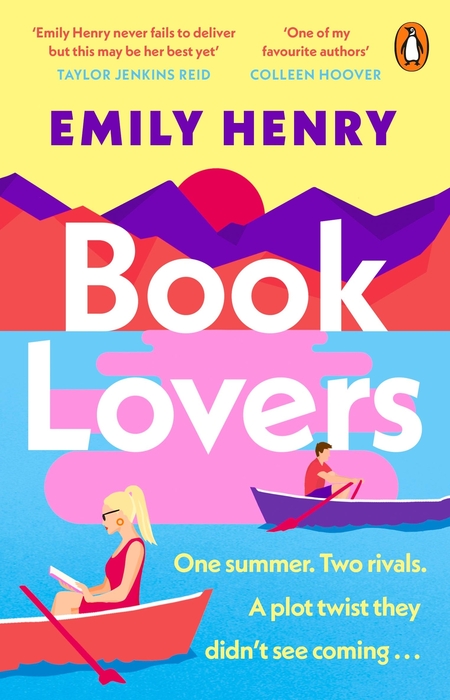Brilliantly well-written romantic comedies are a thing of escapist wonder.
In a world where life too often throws on beige garments, walk at a sullenly glacial pace through each and every day and spends its free time doing tax returns and crunching rainfall data from 1943, rom-coms often us the chance to believe things can be magical, uplifting and sparklingly delightful.
It’s a seductively romantic sales pitch and it’s on gloriously energising display in Emily Henry’s gem of a rom-com tale, Book Lovers, which frankly everything you could ever want from a member of the effervescently fizzy genre.
It manages to do this with a terrifically clever balancing of all the great tropes of the genre while casting a slightly seditious eye at them, with lead character Nora Stephens, a high-powered, merciless literary agent from New York City, spending equal amounts of time ridiculing the very idea of meet-cutes and life-changing romantic assignations at the time as she slowly and surely succumbs to one.
That might comes across in lesser hands as having a lazy bet each way, but Henry is such a masterful writer – she has previously gifted us with Beach Read and You and Me on Vacation – that you totally buy that Nora could be a cynic of the highest order, her time in publishing convincing her there is no such thing as a happy ending, and that when she discovers that might actually be possible, she would slide on down to the finish line whose very existence she once rubbished with existential fierceness.
“On Hepburn nights, the three of us would each pick out one of Mom’s over-the-top vintage robes and curl up in front of the TV with a root beer float and a pizza, , or a decaf and chocolate pie, and watch an old black-and-white movie.
Mom would cry during her favorite scenes, and when Libby or I caught her, she’d laugh, wiping away her tears with the back of one hand, and say, I’m such a softy.
I [Nora] loved those nights. They taught me that heartbreak, like most things, was a solvable puzzle. A checklist could guide a person through mourning. There was an action plan for moving on …” (p. 48)
One very appealing aspect of this highly entertaining, whip-smart read is that it operates as a love letter to reading, the power of the written word and the shaping and molding of stories, as much as it does the slow coming together of Nora Stephens, hard-edged professional woman on the move and Charlie Lastra, a highly-respected, fiercely-driven editor with whom Nora, at their fraught first lunchtime meeting, is hoping to work.
Books are everywhere, not simply because Nora and Charlie both work in the publishing industry but because their love of reading is what draw them to their respective roles in the first place, and while they may not have much time for each other, at least at first, they have a huge amount of time for books, a uniting area of interest that proves to be rather pivotal early one.
Now, if you have even slightly grazed the edge of this fairy floss light and bright genre – I am a fan of rom-coms to the very core of my being so this is not a putdown of any kind but one of the reasons I love these stories so much, especially when life is bleak and dark like it has been over the last 2 1/2 years – one of the tropes you will recognise almost instantly is that two sparring opposites, in this case the nemeses in professional garb, are all but guaranteed to fall into each other’s arms by story’s end.
Not even the hint of a spoiler and honestly, that is a fairly compelling reason why we flock to rom-coms; they offer a sense of shiny, happy inevitability in a world that is rarely something you can count on.
With that certainty neatly put to bed (ahem), we can focus on some of the other things that make Book Lovers such an overwhelming heart-swelling delight.
For a start, it absolutely shines with pithy, clever, funny, pointed dialogue that is right up among the best you’ll ever find in any rom-com; in fact, so good is it, and so well does Henry balance the snark and the growing, though underlying attraction inherent in every deliciously curled word traded, that you feel like a fan watching the most superlatively good of tennis games, the metaphorical ball flying back and forth over the net with playful alacrity.
While we have a good sense of who Charlie and Nora thanks to Henry deftly and fulsomely drawing them out in their first charged meeting, we quickly get to know them even better via dialogue that sizzles and barbs while bit by bit, letting in shards of vulnerability and slivers of expositional insight.
It’s a dance of reluctant romance in the form of witty words and it imbues so much of Book Lovers with a comedically inspired but revealingly emotionally resonant air that you live for every single fabulous conversation Nora and Charlie have.
Even when it’s clear they are falling for each other, and attraction is so evident they might as well have neon signs screaming “YES!” glowing above their heads, the dialogue is rich, full and emotively funny, a sparkling dance that never ceases to entertain or move you as the case may be.
“But for a minute, upstairs, with Charlie’s arms tight across my back, everything was okay.
I was okay.
Drifting in a comforting, bodiless dark, where nothing needed to be fixed and I could just–I think of Sally’s arms lifting at her sides–settle. P. 235)
Impressive too is the way that Henry manages to keep the spark and passion richly alive even when she is cutting right to the marrow of both characters.
We come to understand, not simply by what they say to each other but by what they think to themselves, just how well-rounded and vulnerable these two injured but hopeful souls are, with Henry quickly moving, through people like Nora’s closer-than-close younger sister Libby for whom she would do anything, and the townspeople of Sunshine Falls where the two sisters holiday for a month and naturally have their lives changed, to flesh them out well beyond our initial sharp impressions of them.
They are from being intense one-note characters and this is established time and again so that by the time Libby’s plan come to fruition, and rather happily it’s not even remotely what you imagine what it will be at the start, yet another sign of Henry’s happy ability to routinely subvert expectations, you feel like you know the two central characters super well and want them to have all the happiness in the world.
Honestly you’ll be buoyed and energised near the end of this piece of emotionally substantial romantic confection, that you’ll want everyone in the town to live happily ever after, yes even weird dating option Blake (well, maybe) but mostly you’ll want all the loveliness and hope and possibility to come Nora and Charlie’s way because while they are falling for each other, you’ll be falling in love with them.

